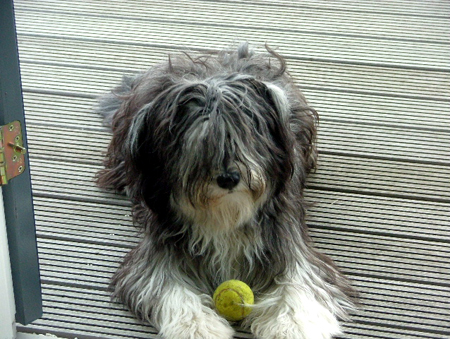

Prezes Bunkier v. PON Nouraika, Netherlands
The Yin and Yang of the PON Digestive System
or
Striving towards a well balanced Healthy PON digestive system
| The concepts of Yin and Yang contributed to the Chinese
scientific system, particularly in fields like biology and medicine The
organs of the body were seen to be interrelated in the same kinds of ways
as other natural phenomena, and most understood by searching for cause and
effect. Illness was seen as a disturbance in the balance of Yin and
Yang caused by emotions, heat or cold, or other influences. Therapy
thus depended on accurate diagnosis of the source of the imbalance.
PON owners can readily apply Yin and Yang to their management of PON nutrition and ultimately to solving digestive issues. Unfortunately, little has been written about this breed's requirements, other than traditional advice from early PON breeders in Poland about avoiding diets too high in protein. These days, most commercial dog foods boast of high protein levels in their food and this has encouraged newcomers to the breed to offer a rich diet that often leads to digestive upsets. Further, some members of this breed react to gluten, wheat, certain types of proteins, rice, corn and preservatives. Once the initial shock reaction of owners have passed, they tend to seek advice from their breeders, internet lists , web sites and books on the subject of diet and nutrition. In most cases, opinions differ and this adds to wide spread confusion. What is the truth ? What is a myth ? How can owners inform themselves of the best approach towards striving towards a well balanced, healthy PON digestive system? Most important, owners need to be aware of differences among members of this breed and realize that what works for one PON will not work for all PONS. Also, a dog food which triggered stones for some PONS, may not trigger stones for all PONS. Once this basic principle has been absorbed and understood by owners, they will be able to become more scientific and do their own individual research. Commercial dog food companies are fully aware of wide spread digestive problems among canines and have started producing new types of kibble which are gluten-free with exotic types of proteins. It is the responsibility of every PON owner to update themselves on this wonderful trend and inspect the list of ingredients before making a final decision. Yes, owners can consult auntie Wendy for her imput on diet and hear reports of alternative diets, but in the long run, owners need to live with the consequences of their decisions and auntie is not always available, especially when messes abound at home. Many alternative diet options do not agree with all PONS and in some cases, there is a higher bacteria level risk for them. There are additional considerations as well, when deciding on the best diet for your own PON.
Repeated ear infections can be due to food allergies: For example, some people find that eliminating corn and corn byproducts from their dogs' diets reduces or eliminates chronic ear infections and other recurrent/ongoing health problems. Gluten allergies: Veterinary researchers have identified wheat gluten as a dietary ingredient associated with seizures in dogs. Some humans are allergic to gluten as well. If your dog has seizures, check to see if any food you use contains gluten, and if so, consider switching to another food...or to home-prepared foods. There are dozens of excellent supplements that can be added to a PON's diet. These include a half-teaspoon daily each of flaxseed oil packed with EFAs (essential fatty acids), which can help clear up skin conditions, relieve arthritic and inflammatory pain, as well as improve overall health ... kelp, powdered seaweed, sea and ocean algae and other sea vegetables, a rich source of minerals often used to detoxify, heal and achieve balanced nourishment ... and wheat germ to stimulate tissue regeneration. Vitamin B complex provides a number of health benefits. In addition, holistic health practitioners report that B vitamins calm a stressed nervous system as well as help repel fleas. Please consult your vet for more detailed advice about dosage. Organic apple cider vinegar (ACV) aids in digestion, boosts immunity, helps alleviate skin problems, and helps the body repel fleas and ear mites. You can administer ACV several ways. Dilute ACV with an equal amount of rubbing alcohol to wash out and dry ears (however, don't do this if the ears are ulcerated, as it might burn). ACV can be given internally to strengthen an animal's natural immune system and aid digestion. Add a splash of organic ACV daily in the drinking water or on your pet's food. It's best to buy the organic unfiltered variety, since filtering removes some of the beneficial components of ACV. In addition, you can spray it on dry skin to alleviate itching. It might take your PON a little while to get used to the taste or smell, but most will come to accept and even like it in short time. kefir can help relieve all intestinal disorders, promote bowel movement, reduce flatulence and create a healthier digestive system. In addition, its cleansing effect on the whole body helps to establish a balanced inner ecosystem for optimum health and longevity. Itchy skin, allergies, prone to ear infections? One approach that works for some PONS is to stop filling the water dish with tap water and instead use only filtered water. Essential fatty acids, especially omega-3 and omega-6, help recondition dry skin and relieve irritation. To help PONS with anal gland problems, nationally syndicated columnist Michael Fox, DVM, suggests a half-teaspoon of dietary-grade bone meal supplement or one crushed 500-milligram tablet calcium supplement tablets daily for a 30-pound dog. Please consult your vet for professional advice on all health issues. You can apply the principles of Yin and Yang for the betterment of your PON's digestive system by staying objective, thinking for yourself and avoiding the latest diet craze.
|
ponbreeders/internationalrecipes/faq/ingredients/ponpaw/yinyang/aromatherapy/ponhoroscopes